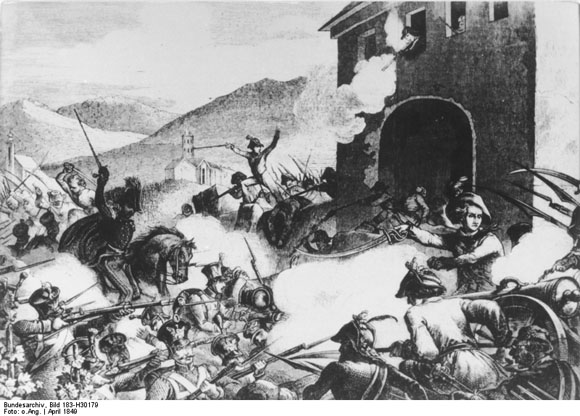Source

Source: Drawing from Leipziger Illustrirte Zeitung, vol. X, no. 259 (1848), p. 399. Leipzig, June 17, 1848. Available online at: https://anno.onb.ac.at/cgi-content/anno?aid=izl&datum=18480617&seite=9&zoom=33
On April 13, 1848, the radical democrat and revolutionary leader Friedrich Hecker (1811–1881), together with Gustav Struve (1805–1870), tried to assemble an armed volunteer corps—the plan being to march into Karlsruhe (the capital of Baden), topple the Grand Duke, and implement the goals of the March Revolution. The throng of sympathizers expected to join the so-called Hecker Campaign [Heckerzug] never materialized, however, and it was halted by federal troops within a few days. Hecker and Struve were able to flee. Individual republican groups in Baden learned of Hecker’s defeat but went on trying to resist the soldiers of the German Confederation, as can be seen in this illustration, which depicts the suppression of an uprising on April 24, 1848, in Freiburg. Government troops had managed to storm the barricades blocking the doors of the city and, after brief fighting, quickly suppressed the revolutionaries. After the failure of the Hecker Campaign, the revolutionaries split into two factions: the radical democrats and the moderate left. In the end, this split was one of the causes of the failure of the entire revolution. Especially in the relatively liberal state of Baden, many liberals believed that an ongoing, violent pursuit of revolutionary goals stood to endanger what had already been achieved. At this point, most of them still believed that the Frankfurt National Assembly, which was set to convene, would transform their demands into reality. Drawing from Leipziger Illustrirte Zeitung (1848).

Source: Drawing from Leipziger Illustrirte Zeitung, vol. X, no. 259 (1848), p. 399. Leipzig, June 17, 1848. Available online at: https://anno.onb.ac.at/cgi-content/anno?aid=izl&datum=18480617&seite=9&zoom=33
© Bundesarchiv, Bild 183-H30179